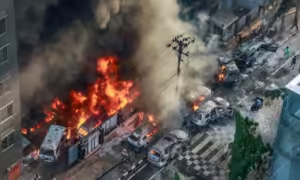Bangladesh student protests turn into ‘mass movement against a dictator’

Strength of PM’s crackdown shows her nervousness and that climate of fear is breaking down, say critics
Bangladesh student protests turn into ‘mass movement against a dictator’
Strength of PM’s crackdown shows her nervousness and that climate of fear is breaking down, say critics
Hasan still has the metal pellets Bangladesh police fired at him lodged deep in his bones. Fearful he will join the growing ranks of those thrown behind bars by the state for participating in protests that have swept Bangladesh this month, Hasan has been in hiding for a week and described his state as one of “constant panic and trauma”.
“Whenever I hear the sound of a car or a motorbike, I think it might be the police coming for me,” he said.
When the 33-year-old telecommunications graduate joined the protests in Bangladesh’s capital, Dhaka, at the beginning of July, they were a peaceful affair. Students across the country had mobilised to oppose the reintroduction of quotas for all government jobs, meaning 30% would go to descendants of those who fought in the 1971 war of independence.
While it was a decision made by the courts, it was seen by many as a thinly veiled political manoeuvre by the prime minister, Sheikh Hasina, who has a tight grip over the judiciary. The reintroduction of the quotas was widely considered to be a move to appease those in her Awami League – a party born out of Bangladesh’s independence fight – who are much more likely to benefit and ensure Hasina could fill the government with allies.